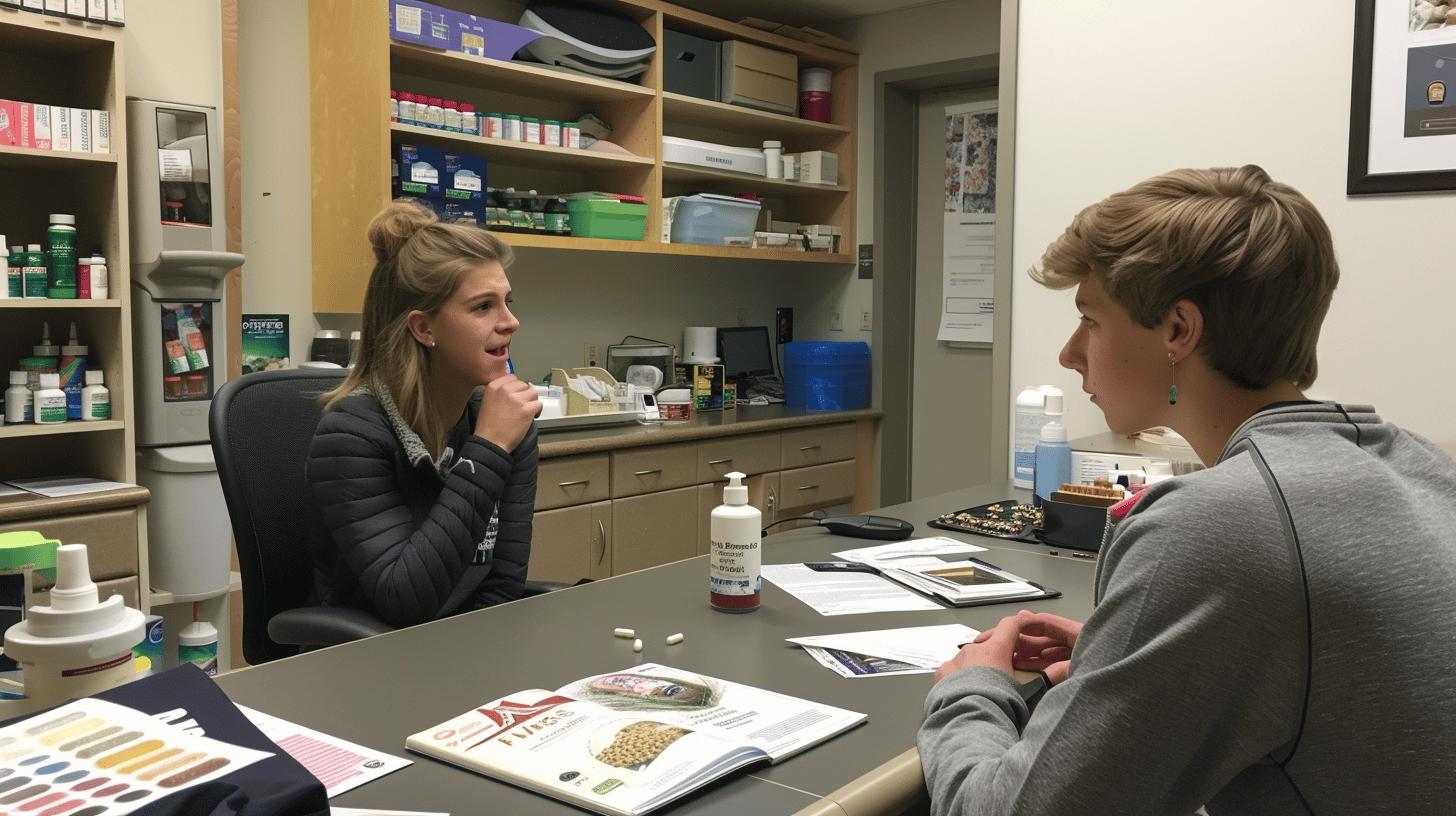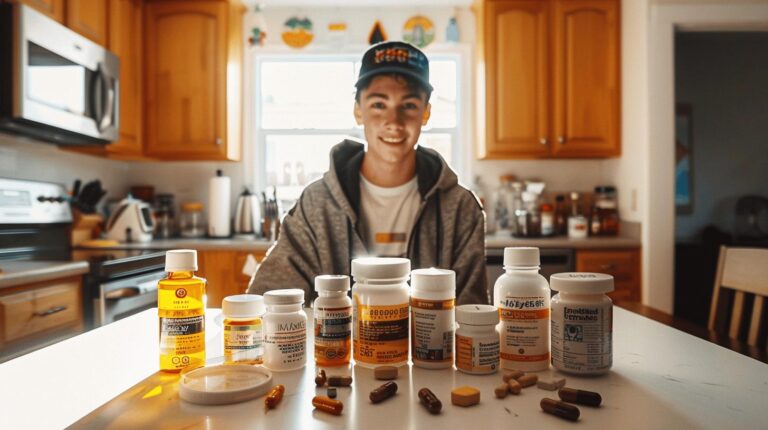Are you confident your teen is getting all the nutrients they need? During the teenage years, bodies undergo rapid and significant changes, making the demand for essential vitamins and minerals crucial. Unfortunately, poor dietary habits often lead to nutrient deficiencies. This article delves into the top 10 supplements that can help teenagers boost their overall health. From supporting immune function to aiding in bone development and cognitive growth, these supplements provide a structured pathway to ensure your teen’s optimal health and development. Explore the key nutrients and how to seamlessly incorporate them into your teen’s diet.
Essential Vitamins and Minerals for Teens
During teenage years, the body undergoes rapid changes, including growth spurts and hormonal shifts. These changes increase the demand for essential vitamins and minerals that support development. Unfortunately, poor dietary habits often result in deficiencies, making it difficult for teenagers to meet their nutritional needs through food alone.
Vitamin A is particularly crucial for teenagers. It supports a healthy immune system, protects eye health, maintains skin integrity, and aids in cell growth and development. Without sufficient Vitamin A, teens may experience weakened immunity and impaired vision. Similarly, other vitamins and minerals are essential for various physiological functions, including bone development, muscle function, and cognitive performance.
6 most critical vitamins and minerals for teens:
- Vitamin A
- Vitamin D
- Vitamin C
- Iron
- Calcium
- Magnesium
Incorporating these essential nutrients into a teenager's diet can be achieved through a combination of food and supplements. Foods rich in Vitamin A include carrots, sweet potatoes, and spinach. Vitamin D can be sourced from fatty fish, fortified dairy products, and direct sunlight. Vitamin C is abundant in citrus fruits and vegetables like bell peppers. Iron can be found in red meat, beans, and fortified cereals, while calcium is present in dairy products and leafy greens. Magnesium is available in nuts, seeds, and whole grains. When dietary options are insufficient, supplements can help fill these nutritional gaps, but it is always advisable to consult a healthcare provider before starting any supplementation regimen.
Best Supplements for Teenage Growth
Teens undergo significant physical growth during puberty, which increases their nutritional needs. Often, both teens and parents are unaware of these increased needs and continue with their usual diet, which may not be sufficient. A study in the Journal of the American Dietetic Association found that teenagers who take a daily multivitamin have a healthier diet and lifestyle compared to those who don't.
Calcium
Calcium is essential for bone development, particularly during the growth spurts that occur in adolescence. Adequate calcium intake helps build strong bones and teeth, reducing the risk of fractures and osteoporosis later in life. Foods rich in calcium include dairy products like milk, cheese, and yogurt, as well as leafy green vegetables such as kale and broccoli. For those who are lactose intolerant or vegan, calcium-fortified plant milks and juices are good alternatives.
Vitamin D
Vitamin D is crucial for calcium absorption, making it a vital nutrient for bone health. Without sufficient Vitamin D, the body cannot effectively utilize the calcium consumed, leading to weaker bones. Sources of Vitamin D include sunlight exposure, fatty fish such as salmon and mackerel, and fortified foods like milk and cereals. In regions with limited sunlight, particularly during winter months, Vitamin D supplements can be beneficial.
Omega-3
Omega-3 fatty acids play a significant role in brain development and overall growth. These essential fats contribute to the development of cell membranes, reduce inflammation, and support cardiovascular health. Omega-3s are found in fatty fish like salmon, flaxseeds, chia seeds, and walnuts. For teens who do not consume these foods regularly, fish oil or algae-based supplements can help meet their Omega-3 needs.
| Supplement | Benefits |
|---|---|
| Calcium | Supports bone development and strength |
| Vitamin D | Enhances calcium absorption and bone health |
| Omega-3 | Promotes brain development and overall growth |
Multivitamins for Teens: What to Look For

It is safe and normal for teens to take vitamin supplements alongside a varied diet. The American Academy of Pediatrics states that healthy teens with well-balanced diets typically do not need vitamins and supplements, but they can be beneficial for those with dietary gaps. This ensures that any nutritional deficiencies are addressed, supporting overall health and development.
5 key factors to consider when selecting a multivitamin:
- Comprehensive nutrient profile
- Age-appropriate dosage
- Quality and purity of ingredients
- Absence of artificial additives
- Brand reputation
Examples of reputable brands and products include Nature Made, Garden of Life, and Rainbow Light. These brands are known for their high-quality, well-rounded multivitamins specifically designed for teens. Products like Nature Made Teen Multivitamins, Garden of Life Vitamin Code Youth, and Rainbow Light Active Health Teen Multivitamins offer comprehensive nutrient profiles without artificial additives, ensuring teens receive the essential vitamins and minerals they need for optimal growth and health.
Addressing Common Teen Health Issues with Supplements
Teenagers often face a variety of health issues, including depression, anxiety, and mood swings. These issues can be exacerbated by the rapid physical and hormonal changes that occur during adolescence. Supplements can play a role in managing these conditions by providing essential nutrients that support mental and emotional health. While over-the-counter vitamin supplements are generally safe, it is crucial to avoid excessive intake, as it can be toxic. Always adhere to the recommended dosages to prevent any harmful effects.
Teenage Depression and Anxiety
Supplements can help alleviate symptoms of depression and anxiety in teenagers by addressing nutritional deficiencies that may contribute to these conditions.
3 recommended supplements:
- Vitamin D
- Magnesium
- Omega-3
Vitamin D has been shown to improve mood and reduce symptoms of depression, especially in individuals with low levels. Magnesium is known for its calming effects and can help reduce anxiety and improve sleep quality. Omega-3 fatty acids are essential for brain health and can alleviate symptoms of both depression and anxiety.
Mood Swings
Mood swings are common during adolescence due to hormonal fluctuations. Certain supplements can help stabilize mood by supporting overall mental health.
3 recommended supplements:
- Vitamin B Complex
- Evening Primrose Oil
- Zinc
Vitamin B Complex supports the nervous system and helps regulate mood. Evening Primrose Oil contains gamma-linolenic acid (GLA), which can balance hormones and reduce mood swings. Zinc is essential for brain function and can help maintain emotional stability.
While supplements can be beneficial, it is important to consult healthcare professionals before starting any new supplement regimen. This ensures that the chosen supplements are appropriate for the teenager's specific health needs and that they do not interact with any other medications or conditions.
Vitamins for Active Teenagers and Athletes
Active teenagers and athletes have increased nutritional needs due to the physical demands of sports and exercise. Proper supplementation can help meet these needs, supporting overall health, performance, and recovery. Teenagers engaged in regular physical activities, especially those involved in weight training or competitive sports, often require additional nutrients that may not be sufficiently provided by their diet alone. Supplements like protein powder and creatine can be particularly beneficial in addressing these gaps.
Protein Powder
Protein powder is highly beneficial for teens aged 14-19 who are engaged in sports, especially those involved in weight training. Protein is essential for muscle repair and growth, making it a critical nutrient for active teens.
3 benefits:
- Muscle repair and growth
- Enhanced recovery
- Improved performance
Protein helps in repairing damaged muscle tissues and promotes muscle growth, which is crucial for athletes. It also aids in enhanced recovery after intense workouts, reducing muscle soreness and fatigue. Improved performance is another significant benefit, as adequate protein intake supports overall physical strength and endurance.
Creatine
Creatine, particularly Creatine Monohydrate, is safe and effective for teens over 14 engaged in strength training. It is a well-researched supplement known for its ability to enhance athletic performance.
3 benefits:
- Increased strength
- Enhanced endurance
- Improved muscle mass
Creatine increases the body's ability to produce energy rapidly, which is vital for high-intensity activities like sprinting and weightlifting. It also enhances endurance, allowing athletes to train harder and longer. Another key benefit is improved muscle mass, as creatine promotes the growth of lean muscle tissue.
While supplements can significantly benefit active teenagers and athletes, it is crucial to maintain a balanced diet rich in whole foods. Supplements should complement, not replace, a nutritious diet. Consulting with healthcare professionals or a sports nutritionist can help tailor a supplementation plan that meets the specific needs of the teen athlete.
Expert Opinions and Recommended Dosages for Teen Supplements

Consulting healthcare professionals before starting any supplement regimen is crucial. Experts can provide personalized advice based on an individual's health needs, ensuring that the chosen supplements are both safe and effective. This preventive step helps avoid potential adverse effects and ensures that the supplements are appropriate for the teenager's unique dietary requirements.
5 expert-recommended dosages for common supplements:
- Vitamin D: 600 IU daily
- Calcium: 1300 mg daily
- Iron: 15 mg daily (girls), 11 mg daily (boys)
- Omega-3: 250-500 mg daily
- Magnesium: 360 mg daily (girls), 410 mg daily (boys)
Identifying reputable supplement brands is essential for ensuring quality and efficacy. Experts advise selecting vitamins from recognized retailers with a longstanding reputation. Avoid new or frequently rebranded companies that are solely available online, as they may lack the credibility and rigorous testing processes of established brands. Be wary of fad vitamins promoted on social media, as they often promise unrealistic results and may not meet safety standards. Reliable brands are transparent about their ingredient sourcing, manufacturing processes, and third-party testing, providing assurance that their products are safe for consumption.
Final Words
In the action, the post emphasised the importance of essential vitamins and minerals for teens, highlighting the need for proper nutrition during rapid growth phases. It detailed the best supplements to support teenage growth, such as Calcium, Vitamin D, and Omega-3.
Guidance was provided on selecting the best multivitamins and addressing common health issues like depression and anxiety. Important supplements for active teenagers and athletes were also discussed, alongside expert opinions on dosages and reputable brands.
Incorporating these supplements for teens can significantly enhance their overall health and development.
FAQ
Is it OK for a 15-year-old to take supplements?
A: Yes, it is generally safe for a 15-year-old to take supplements, provided they are necessary for dietary gaps and dosed appropriately. Consult a healthcare professional for personalized advice.
Can a 14-year-old take adult multivitamins?
A: It is not recommended for a 14-year-old to take adult multivitamins, as they may contain higher doses of nutrients than teens need. Choose age-appropriate multivitamins instead.
What are the best supplements for teenage growth?
A: The best supplements for teenage growth include Calcium for bone development, Vitamin D for calcium absorption, and Omega-3 for brain and overall growth. These support the increased nutritional needs during puberty.
Which vitamins are essential for teenage boys?
A: Essential vitamins for teenage boys include Vitamin A for immune health, Vitamin D for bone strength, Vitamin C for tissue repair, and Iron for energy levels. These address the specific growth and health needs of teenage boys.
What multivitamins are best for a teenage girl?
A: A good multivitamin for a teenage girl should contain essential vitamins like A, C, D, and E, plus minerals like iron and calcium. Ensure the product supports hormonal balance and overall health.
Are iron supplements safe for teens?
A: Iron supplements are safe for teens if taken according to recommended doses. Iron supports energy levels and development. Consult a healthcare provider to determine the need and correct dosage.
What are the key factors to consider when selecting a multivitamin for teens?
A: When selecting a multivitamin, consider a comprehensive nutrient profile, age-appropriate dosage, quality and purity of ingredients, absence of artificial additives, and brand reputation.
What vitamins help with teenage depression and anxiety?
A: Supplements that may help with teenage depression and anxiety include Vitamin D, Magnesium, and Omega-3. These nutrients support mental health and mood regulation.
Which vitamins can address mood swings in teenagers?
A: Vitamins and supplements for mood swings in teenagers include Vitamin B Complex, Evening Primrose Oil, and Zinc. They help stabilize mood and support emotional well-being.
What are the best vitamins for active teenagers and athletes?
A: Active teenagers and athletes benefit from Protein Powder for muscle repair, growth, and performance, and Creatine for increased strength, endurance, and muscle mass.

